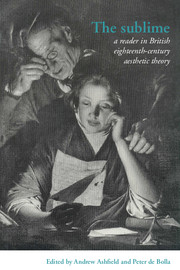Book contents
- Frontmatter
- Contents
- List of Abbreviations
- Introduction
- Part I The Longinian tradition
- Part II Rhapsody to rhetoric
- Part III Irish Perspectives
- Part IV The Aberdonian Enlightenment
- Part V Edinburgh and Glasgow
- Part VI From the Picturesque to the Political
- 41 A dissertation on oriental gardening (1772)
- 42 An essay on the picturesque (1794)
- 43 A review of The landscape (1795)
- 44 The history of the life of William Pitt, Earl of Chatham (1783)
- 45 Enquiry concerning political justice (1798)
- 46 Reflections on the revolution in France (1790)
- 47 A letter from the right honourable Edmund Burke to a noble lord (1796)
- 48 A vindication of the rights of man (1790)
- 49 Letters written in France (1790)
- 50 A tour in Switzerland (1798)
- Sources and further reading
47 - A letter from the right honourable Edmund Burke to a noble lord (1796)
Published online by Cambridge University Press: 05 June 2012
- Frontmatter
- Contents
- List of Abbreviations
- Introduction
- Part I The Longinian tradition
- Part II Rhapsody to rhetoric
- Part III Irish Perspectives
- Part IV The Aberdonian Enlightenment
- Part V Edinburgh and Glasgow
- Part VI From the Picturesque to the Political
- 41 A dissertation on oriental gardening (1772)
- 42 An essay on the picturesque (1794)
- 43 A review of The landscape (1795)
- 44 The history of the life of William Pitt, Earl of Chatham (1783)
- 45 Enquiry concerning political justice (1798)
- 46 Reflections on the revolution in France (1790)
- 47 A letter from the right honourable Edmund Burke to a noble lord (1796)
- 48 A vindication of the rights of man (1790)
- 49 Letters written in France (1790)
- 50 A tour in Switzerland (1798)
- Sources and further reading
Summary
My Lord, it is a subject of aweful meditation. Before this of France, the annals of all time have not furnished an instance of a complete revolution. That revolution seems to have extended even to the constitution of the mind of man. It has this of wonderful in it, that it resembles what Lord Verulam says of the operations of nature: It was perfect, not only in all its elements and principles, but in all its members and its organs from the very beginning. The moral scheme of France furnishes the only pattern ever known, which they who admire will instantly resemble. It is indeed an inexhaustible repertory of one kind of example. In my wretched condition, though hardly to be classed with the living, I am not safe from them. They have tigers to fall upon animated strength. They have hyenas to prey upon carcasses. The national menagerie is collected by the first physiologists of the time; and it is defective in no description of savage nature. They pursue, even such as me, into the obscurest retreats, and haul them before their revolutionary tribunals. Neither sex, nor age – not the sanctuary of the tomb is sacred to them. They have so determined a hatred to all privileged orders, that they deny even to the departed, the sad immunities of the grave. They are not wholly without an object. Their turpitude purveys to their malice; and they unplumb the dead for bullets to assassinate the living.
- Type
- Chapter
- Information
- The SublimeA Reader in British Eighteenth-Century Aesthetic Theory, pp. 292 - 293Publisher: Cambridge University PressPrint publication year: 1996

